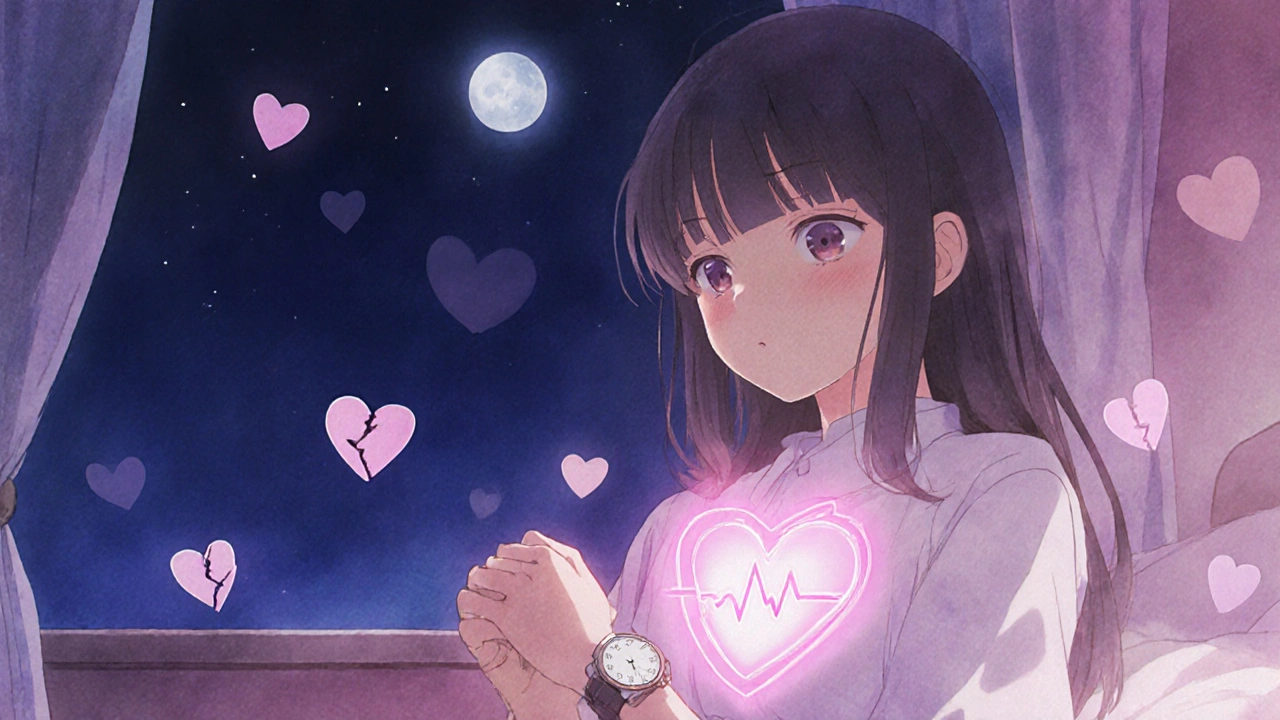When your heart skips a beat, races out of nowhere, or feels like it’s fluttering inside your chest, it’s not just a physical sensation-it’s a scare. For people living with heart rhythm disorders like atrial fibrillation, ventricular tachycardia, or bradycardia, those irregular beats don’t just disrupt the body-they shake the mind. Many assume treatment ends with medication or a pacemaker. But the real healing often starts with something no doctor can prescribe: emotional support.
Heart rhythm disorders don’t just affect the heart
Arrhythmias are more than electrical glitches in the heart. They’re unpredictable. One day you feel fine; the next, you’re in the ER because your heart suddenly slammed into overdrive. That uncertainty creates a quiet, constant fear. You start avoiding stairs. You skip social events. You stop driving because you’re afraid of passing out. You check your pulse every hour. You Google symptoms at 3 a.m. This isn’t just anxiety-it’s cardiac anxiety, a real condition where the fear of your heart failing becomes its own kind of illness.
A 2024 study from the European Heart Rhythm Association found that over 60% of patients with persistent atrial fibrillation reported moderate to severe anxiety related to their condition. Nearly half said they avoided physical activity because they were terrified of triggering another episode. That’s not weakness. That’s the brain reacting to a body that feels unreliable.
Emotional support isn’t optional-it’s part of treatment
Doctors focus on rhythm control, rate control, anticoagulants, ablations. All vital. But if a patient is too scared to move, sleep, or leave the house, those treatments lose their power. Emotional support isn’t a luxury. It’s a medical necessity. Therapy, peer groups, and even simple conversations with someone who gets it can reduce stress hormones like cortisol and adrenaline-both of which can trigger or worsen arrhythmias.
Take Maria, a 68-year-old from Durban who was diagnosed with paroxysmal AFib. After her first episode, she stopped walking to the market. Her daughter noticed she wasn’t eating, wasn’t sleeping, and was constantly checking her wristwatch for her pulse. Her cardiologist added a beta-blocker, but her anxiety didn’t lift until she joined a local cardiac support group. There, she met others who had the same fears. She learned breathing techniques. She stopped seeing her heart as a traitor and started seeing it as something she could learn to live with.
Who provides emotional support-and how?
Support doesn’t have to come from a therapist, though they help. It can come from:
- Family members who listen without trying to fix things
- Support groups where patients share real stories-not just medical facts
- Cardiac rehab programs that include mental health check-ins
- Online communities where people can talk anonymously
- Pets-studies show dog owners with arrhythmias have lower heart rates and less stress
What works isn’t grand gestures. It’s consistency. A daily text. Sitting quietly while they talk. Not saying "just relax"-because that doesn’t work. Instead, saying, "I know this feels scary. I’m here."

Why ignoring emotions makes heart conditions worse
Stress doesn’t just make you feel bad-it changes your heart’s biology. Chronic stress increases inflammation, raises blood pressure, and makes the heart more sensitive to electrical disturbances. In people with existing rhythm disorders, this can mean more frequent episodes, longer hospital stays, and higher risk of complications.
A 2023 study in the Journal of the American College of Cardiology followed 1,200 patients with atrial fibrillation for two years. Those who received structured emotional support-counseling, group sessions, or regular check-ins from nurses-had 38% fewer hospital visits for arrhythmia-related issues than those who didn’t. The difference wasn’t in their meds. It was in their minds.
Ignoring emotional health is like treating high blood pressure with pills but ignoring salt intake. You’re missing half the equation.
What kind of support actually helps?
Not all support is created equal. Here’s what works:
- Validation over advice: Instead of "You should meditate," say "It makes sense you’re scared. That’s normal."
- Routine check-ins: A weekly call from a friend or family member reduces isolation
- Education without overwhelm: Giving patients clear, simple info about their condition reduces fear of the unknown
- Permission to feel bad: Letting them say, "I’m having a hard day," without pressure to be positive
Patients who feel heard report better sleep, improved medication adherence, and more willingness to exercise-even if they still have occasional palpitations.

Where to find help
Support isn’t hard to find-it’s just not always talked about.
- Local hospitals often run cardiac support groups. Ask your clinic.
- Organizations like the Heart and Stroke Foundation offer free online peer groups.
- Therapists trained in cardiac psychology can help reframe fear into manageable thoughts.
- Apps like CardiacCoach and MyHeart Counts include mood tracking and guided breathing exercises.
And if you’re a family member? You don’t need to be a doctor. Just show up. Ask how they’re feeling-not just physically, but emotionally. Let them cry. Let them be angry. Let them sit in silence. That’s the support that saves lives.
It’s not about fixing the heart-it’s about healing the person
Heart rhythm disorders are lifelong conditions. Medications can control them. Devices can regulate them. But only emotional support can help someone live with them without being trapped by fear.
The goal isn’t to make the heart beat perfectly. The goal is to help the person feel safe enough to live fully, even when it doesn’t.
Can emotional stress cause heart rhythm disorders?
Emotional stress doesn’t usually cause heart rhythm disorders on its own, but it can trigger episodes in people who already have them. Conditions like atrial fibrillation or ventricular arrhythmias are often linked to underlying heart issues-scar tissue, valve problems, or genetic factors. But stress, anxiety, and lack of sleep can act like fuel on a fire, making irregular beats more frequent and severe.
Is anxiety common in people with arrhythmias?
Yes, very common. Up to two-thirds of patients report significant anxiety related to their condition. The unpredictability of symptoms creates a fear loop: you feel a flutter, you panic, your heart races more, you panic harder. This is called cardiac anxiety, and it’s treatable with therapy, support groups, and sometimes medication.
Should I see a therapist for my heart rhythm disorder?
If your fear of symptoms is affecting your daily life-like avoiding exercise, skipping social events, or checking your pulse constantly-then yes. Therapists who specialize in cardiac psychology understand how heart conditions impact mental health. They can help you break the cycle of fear and teach you coping tools that reduce both anxiety and heart symptoms.
Can emotional support reduce hospital visits?
Yes. Studies show patients who receive consistent emotional support-including counseling, peer groups, or regular check-ins-have up to 40% fewer hospital visits for arrhythmia-related issues. The reason? Less stress means fewer triggers, better sleep, improved medication habits, and more confidence to manage symptoms at home.
How can family members help someone with a heart rhythm disorder?
Don’t try to fix it. Just listen. Ask how they’re feeling emotionally, not just physically. Learn what triggers their anxiety. Accompany them to appointments if they want. Help them find a support group. Sit with them when they’re scared. Your calm presence is more powerful than you know.


Bruce Bain
November 19, 2025 AT 17:06My grandma had AFib and she just kept going. Walked to church every Sunday, cooked for 12, never checked her pulse. Said, 'If it skips, it skips.' Didn't need therapy. Just needed someone to say, 'You got this.' Simple as that.
Jonathan Gabriel
November 21, 2025 AT 10:33So let me get this straight-we’re now prescribing hugs and text messages as a replacement for ablations? 😏
Don’t get me wrong, emotional support is nice, but if your heart’s doing the cha-cha because of stress, maybe the real issue is that your body’s screaming for a cardiologist, not a therapist who says 'I feel you.'
Also, 'pet owners have lower heart rates'? Cool. So if I get a golden retriever, I can skip the beta-blockers? I’m calling my vet right now. 🐶
Dave Pritchard
November 23, 2025 AT 06:31I work in cardiac rehab and I see this every day. People come in with perfect meds, perfect EKGs, but they’re still terrified to walk to the bathroom.
The magic isn’t in the new drug-it’s in the guy who sits with them after PT and says, 'Yeah, mine did that too. Took me six months to stop checking my pulse every ten minutes.'
It’s not about fixing the heart. It’s about helping the person stop fighting it. Small talk. Quiet presence. That’s the real treatment.
And yeah, pets help. My dog sleeps on my chest. I swear, his heartbeat steadies mine.
kim pu
November 23, 2025 AT 06:33Okay but let’s be real-this whole 'emotional support is medicine' thing is just Big Pharma’s new scam to sell you SSRIs under the guise of 'cardiac wellness.'
They don’t want you to know that arrhythmias are often caused by EMF exposure from 5G towers and fluoridated water. The 'anxiety' they’re selling? That’s just your body’s natural detox response.
And 'support groups'? More like mind-control cults where they make you cry into a tissue while listening to binaural beats. 🤡
Meanwhile, real people are eating magnesium, grounding on dirt, and ignoring the whole narrative. Just saying.
malik recoba
November 25, 2025 AT 03:08My brother had VT and he stopped leaving the house for a year. We didn’t fix his heart with words, but we sat with him. Every night. No advice. Just 'You okay?'
He started walking again after three months. Not because he was 'cured'-but because he felt safe enough to try.
Doctors treat the machine. Family treats the human. Both matter. I’m just glad someone finally said it.
Sarbjit Singh
November 27, 2025 AT 00:31Brother in Christ, this is so true 😊
I had AFib after my wife passed. I thought I was fine till I realized I was checking my pulse 50 times a day. Then I joined an online group with folks from India and Canada. We just talk. No meds talk. Just 'I miss my wife too.'
Now I walk every morning. My heart still skips sometimes. But I don’t panic. God and my brothers in the group got me through. 🙏❤️
Premanka Goswami
November 28, 2025 AT 05:47Wait-so emotional support reduces hospital visits? That’s convenient.
Who funds these 'studies'? The same companies that sell pacemakers, beta-blockers, and therapy apps? Coincidence?
They want you to think your heart is broken because you're 'stressed.' But what if your heart is reacting to toxins in your food, your water, your WiFi, your vaccines?
Emotional support? Nah. What you need is a 30-day cleanse, a Faraday cage, and to stop watching the news.
They’re turning cardiac patients into emotional laborers while the real causes get buried. Wake up.
Alexis Paredes Gallego
November 28, 2025 AT 12:50THIS IS A SETUP. A PSYCHOPHARMACEUTICAL SMOKESCREEN.
They don’t want you to know that arrhythmias are caused by glyphosate poisoning and the government’s secret mind-control frequencies in public water.
They tell you to 'join a support group' so you stop asking hard questions. They give you a therapist so you never find out your pacemaker is transmitting data to a private military contractor.
And don’t get me started on 'pets lowering heart rates'-dogs are trained to detect fear. They’re not calming you-they’re feeding your anxiety to the algorithm.
They’re gaslighting you into believing your body is broken… while they harvest your biometrics.
I’ve stopped checking my pulse. I’ve stopped trusting doctors. I’ve started wearing a tinfoil hat. And guess what? My heart hasn’t skipped once since.
They’re afraid of what happens when people stop being afraid.
And now you’re all just… compliant.